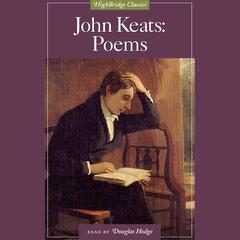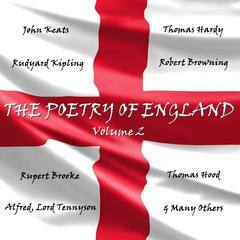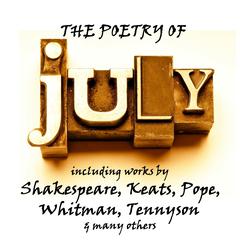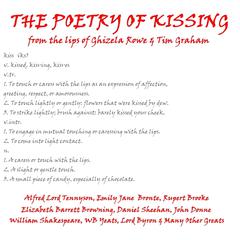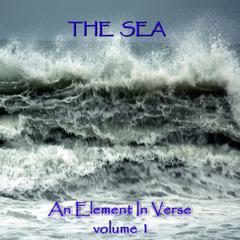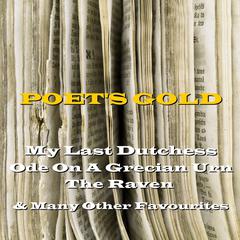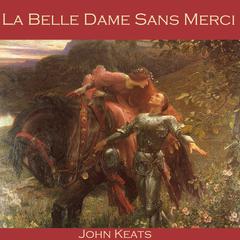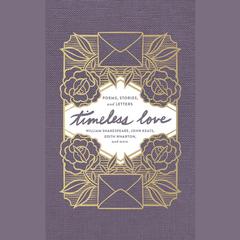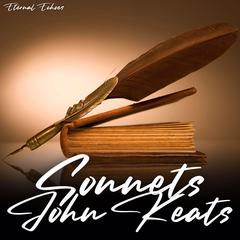 Play Audiobook Sample
Play Audiobook Sample
John Keats: Selected Poems Audiobook
 Play Audiobook Sample
Play Audiobook Sample
Quick Stats About this Audiobook
Total Audiobook Chapters:
Longest Chapter Length:
Shortest Chapter Length:
Average Chapter Length:
Audiobooks by this Author:
Publisher Description
One of the most distinctive periods in poetry occurred in England early in the 1800s. This is now referred to as the age of romanticism, a movement which rebelled against the neoclassical forms and celebrated the imagination as a spiritual force. John Keats was a prominent shaper of this new movement, and as such, he was not without his critics.
"I think I shall be among the English Poets after my death," he soberly prophesied. Indeed, Keats suffered an early tragic death of tuberculosis at the age of twenty-five but today is recognized as the archetypal romantic genius who explored the limits of the imagination and celebrated the pleasures of the senses.
Unlike Shelley, Keats was not a political poet; his prime passion was for art. His muse was the goddess of beauty and truth, and his worship of her found its finest expression in his immortal odes, which stand unique in literature, unexcelled in perfection.
The poems collected here are:
1. "Oh Chatterton! How Very Sad Thy Fate"
2. "O Solitude! If I Must with Thee Dwell"
3. "To One Who Has Been Long in City Pent"
4. "On First Looking into Chapman's Homer"
5. "To My Brothers"
6. "Great Spirits Now on Earth Are Sojourning"
7. "On the Grasshopper and Cricket"
8. "After Dark Vapours Have Oppressed Our Plains"
9. "On Seeing the Elgin Marbles"
10. "On the Sea"
11. A Selection from "Endymion"
12. "To Mrs. Reynolds' Cat"
13. "On Sitting Down to Read King Lear Once Again"
14. "When I Have Fears That I May Cease to Be"
15. "Lines on the Mermaid Tavern"
16. "O Thou Whose Face Hath Felt the Winter's Wind"
17. "For There's Bishop's Teign"
18. "On Visiting the Tomb of Burns"
19. "Old Meg She Was a Gipsey"
20. "This Mortal Body of a Thousand Days"
21. "There Is a Joy in Footing Slow across a Silent Plain"
22. "The Eve of St. Mark"
23. "Why Did I Laugh Tonight? No Voice Will Tell"
24. "Bright Star, Would I Were Stedfast as Thou Art"
25. "Hyperion: A Fragment" (Book I), II, and III)
26. "Hyperion: A Fragment" (Book I, continued; Book II, Book III)
27. "La Belle Dame sans Merci: A Ballad"
28. "Sonnet to Sleep"
29. "Ode to Psyche"
30. "Ode to a Nightingale"
31. "Ode on a Grecian Urn"
32. "Ode on Melancholy"
33. "Ode on Indolence"
34. "Lamia" (Part I)
35. "Lamia" (Part I, continued; Part II)
36. "To Autumn"
37. "The Fall of Hyperion: A Dream"
38. "This Living Hand, Now Warm and Capable"
Download and start listening now!
"I would have given this edition 5 stars, because it is my humble opinion that John Keats is perhaps the greatest poet to have ever walked this earth; however, this edition had numerous spelling and punctuation errors."
— Christine (4 out of 5 stars)
Quotes
-
“No one else in English poetry, save Shakespeare, has in expression quite the fascinating felicity of Keats, his perception of loveliness. In the faculty of naturalistic interpretation, in what we call natural magic, he ranks with Shakespeare.”
— Matthew Arnold -
“Davidson’s renderings are marvelous and unexpected.”
— AudioFile
John Keats Listener Reviews
-
" Excellent book. Everything you could ever want from Keats. "
— Michael, 1/11/2014 -
" It's Keats. What else can I say? "
— Craig, 12/16/2013 -
" It's Keats. No questions asked. "
— Adriana, 12/10/2013 -
" I would totally party with Keats. Didn't discover him until college, but quickly fell in love. "
— Sarah, 7/2/2013 -
" "When I have fears that I may cease to be..." "
— Monica, 3/3/2013 -
" One of my favorite poets. Aye, he left too soon. "
— Jessica, 1/8/2013 -
" Imagination, emotion and honesty combined. What enthralling stories were told, with dreamlike romanticism and linguistic precision. "
— Linda, 10/2/2012 -
" In my eyes, Keats can do no wrong. I love this man. Heartbreakingly gorgeous stuff here, folks. "
— Laurel, 4/20/2012 -
" It doesn't get much better than Keats. "
— Pamela, 3/19/2012 -
" couldn't read it all. i just wanted to read some of his poems. "
— Stephanie, 1/8/2012 -
" I have an old Odyssey Pres volume with a dozen or so bits of paper stuck between the pages marking my favorite poems. "
— Michelle, 10/13/2011 -
" John Keats is the new Shakespeare. "
— Maria, 7/11/2011 -
" Another valuable source of material for my novel in progress, Grandpa Art, as well as insight into The Stress of Her Regard by Tim Powers. "
— J.A., 5/3/2011 -
" I feel exactly the same, for better or worse. "
— Marcos, 4/21/2011 -
" This was my first favorite. When I was a young teen, I carried this collection around everywhere I went. I still have it. It's held together with duct tape. "
— Michael, 8/11/2010 -
" I am usually not a fan of highly structured poetry but I found these to be refreshing and quite enjoyable. "
— Robert, 11/29/2009 -
" really mixed bag. some great poems and some with context that was too antiquated for me. "
— Kevin, 10/30/2009 -
" I just love good poetry. Keats is one of the bests. "
— Inna, 2/14/2009 -
" Excellent! I wanted to reread Endymion in particular. It's a beautiful poem. "
— Michael, 3/31/2008 -
" Very touching. To be read with a leisurely mind. But i found the language quite complicated due to myriad references to Greek mythology - so missed out the context altogether. But those few poems i could understand, i appreciated thoroughly. "
— Hriday, 2/7/2008 -
" I prefer to the poem called "The Ode to Nightingale" for the rest of the book. It's quite completely thrilled to take a glimpse on it. (Although it's a tough task for a beginner reader, that's for sure.) "
— Kriangkrai, 2/6/2008 -
" Keats is one Britt poet you'll inevitably come into contact with when studying literature. His most famous poem, Ode to a nightingale, is probably my favorite of his. "
— Stephen, 12/11/2007
About John Keats
John Keats (1795–1821) was an English romantic poet. Along with Lord Byron and Percy Bysshe Shelley, he was one of the key figures in the second generation of the romantic movement, despite the fact that his work had been in publication for only four years before his death. During his life, his poems were not generally well received by critics; however, after his death, his reputation grew to the extent that by the end of the nineteenth century he had become one of the most beloved of all English poets. He has had a significant influence on a diverse range of later poets and writers. His poetry is characterized by sensual imagery, most notably in the series of odes. Today his poems and letters are some of the most popularly read and analyzed.
About Frederick Davidson
Frederick Davidson (1932–2005), also known as David Case, was one of the most prolific readers in the audiobook industry, recording more than eight hundred audiobooks in his lifetime, including over two hundred for Blackstone Audio. Born in London, he trained at the Royal Academy of Dramatic Art and performed for many years in radio plays for the British Broadcasting Company before coming to America in 1976. He received AudioFile’s Golden Voice Award and numerous Earphones Awards and was nominated for a Grammy for his readings.




